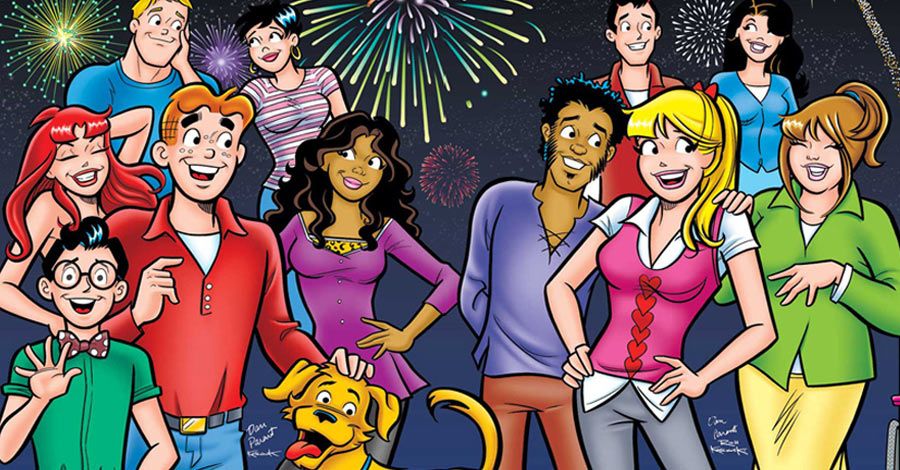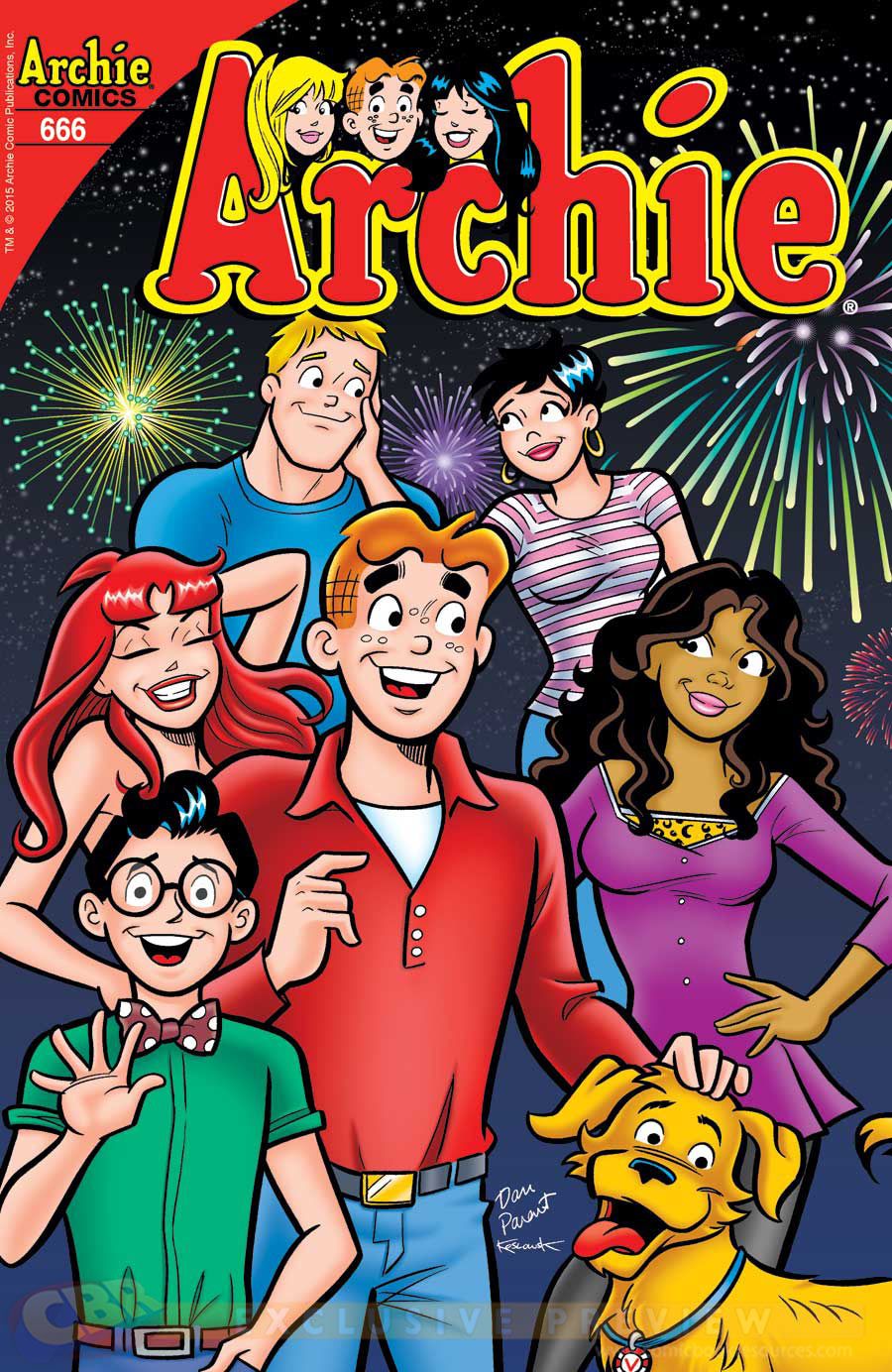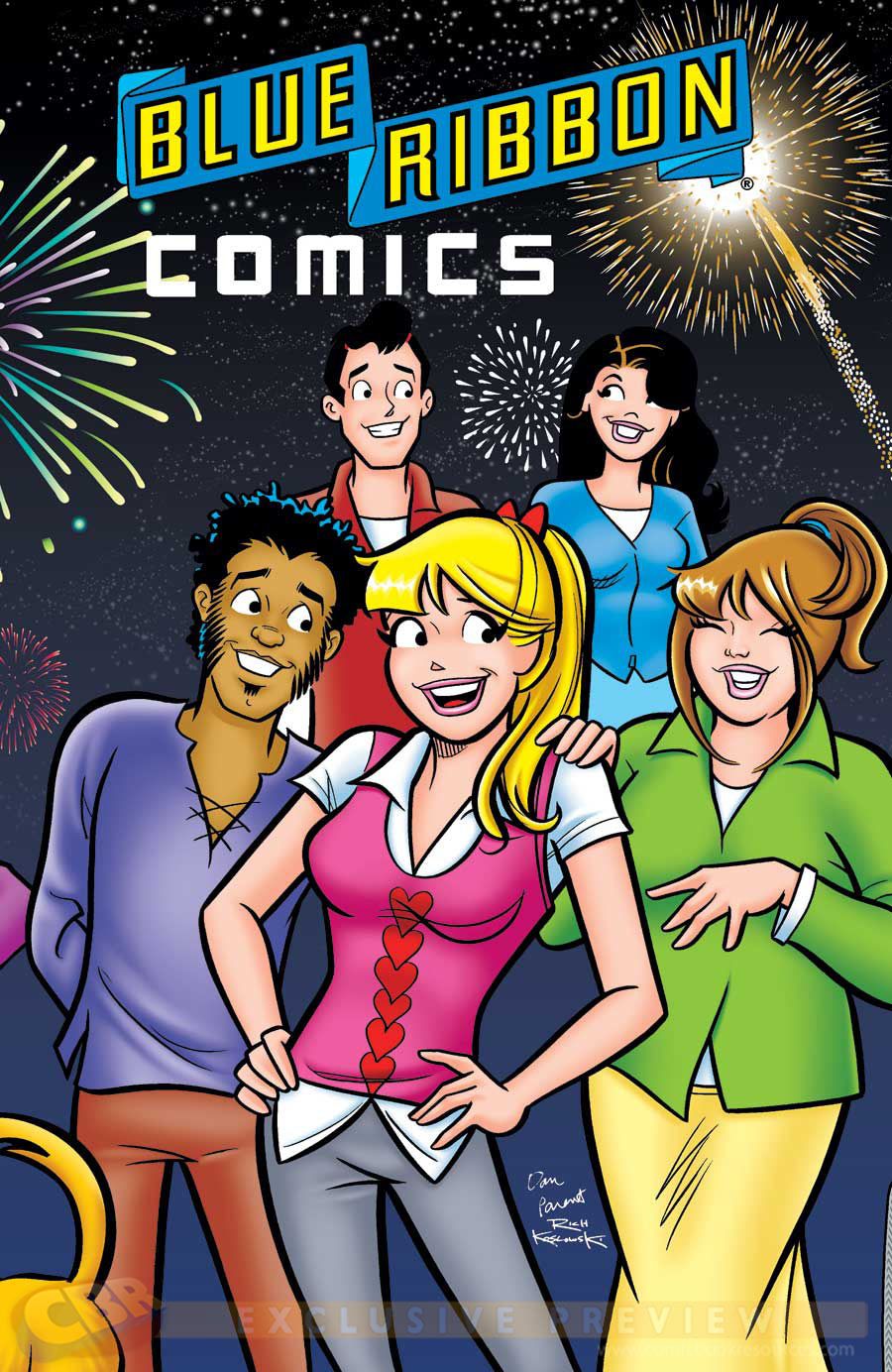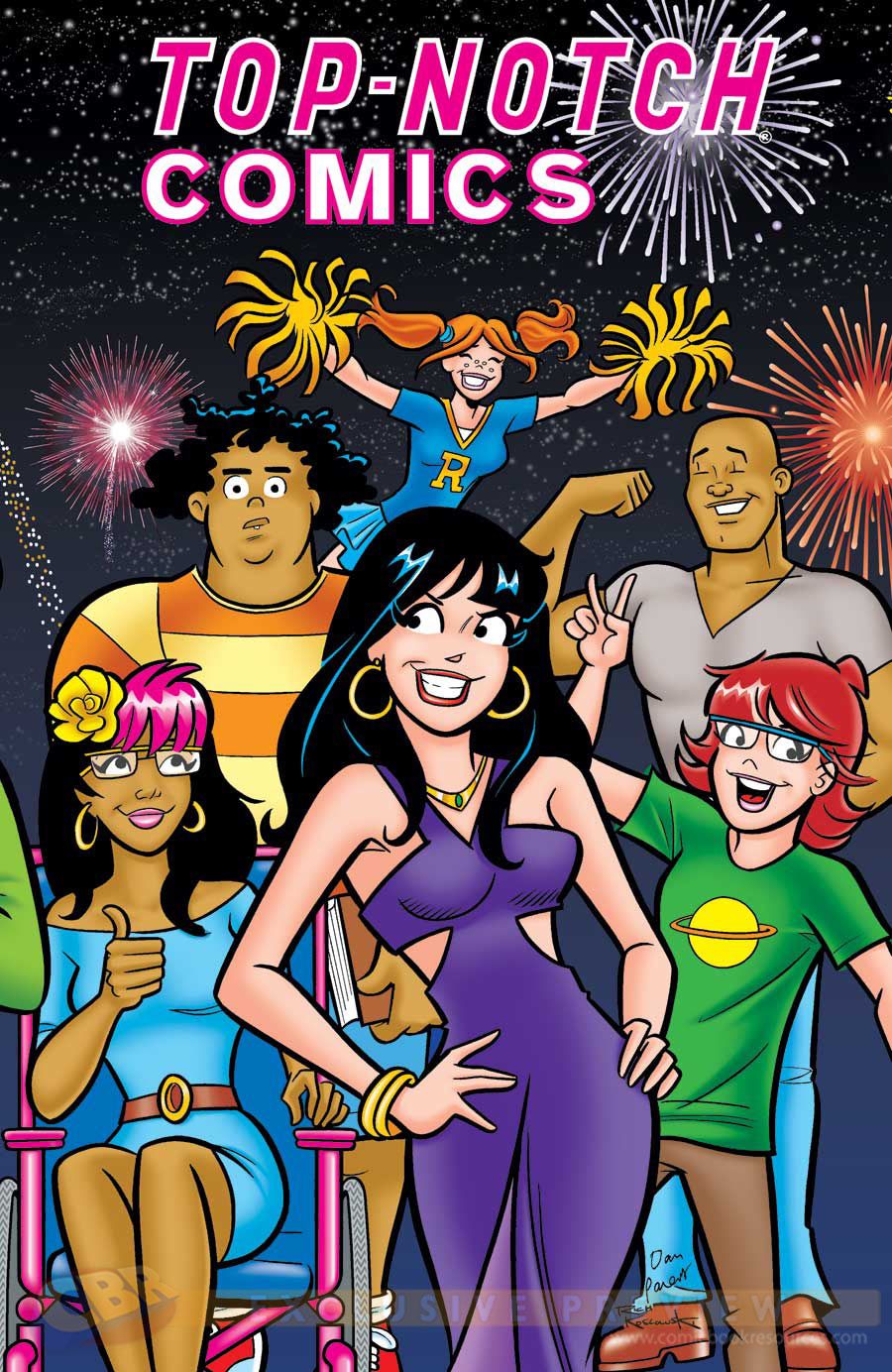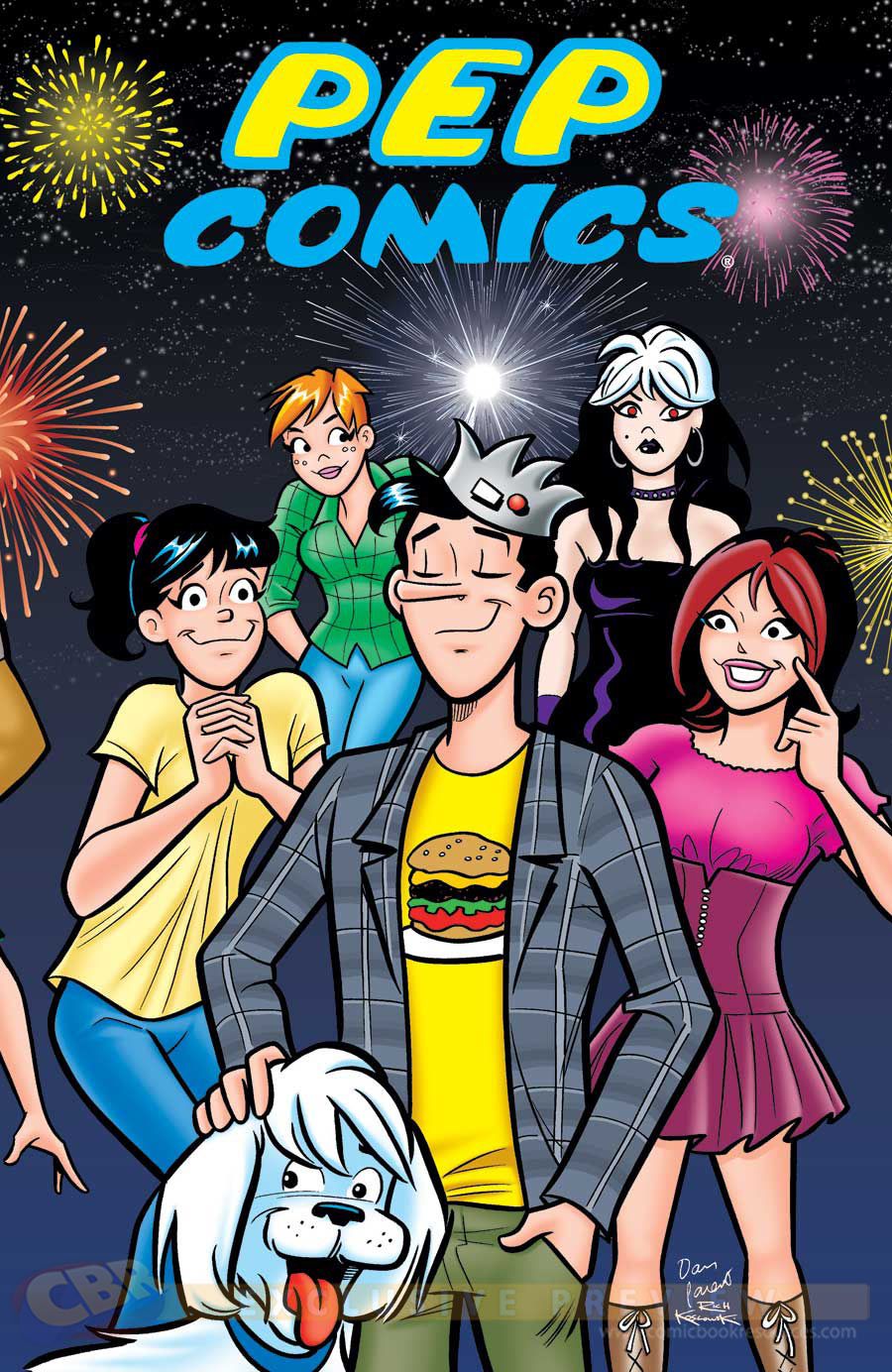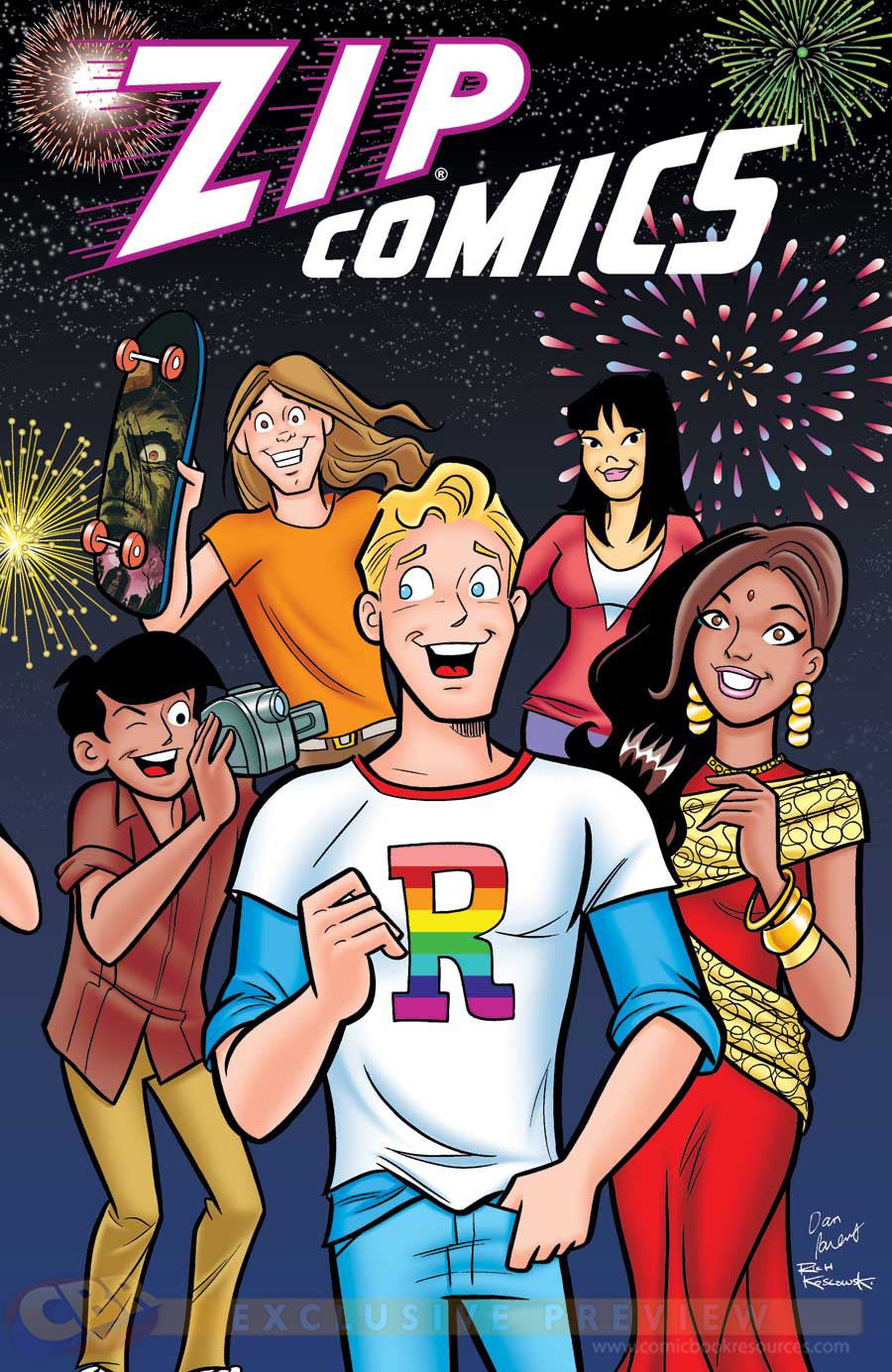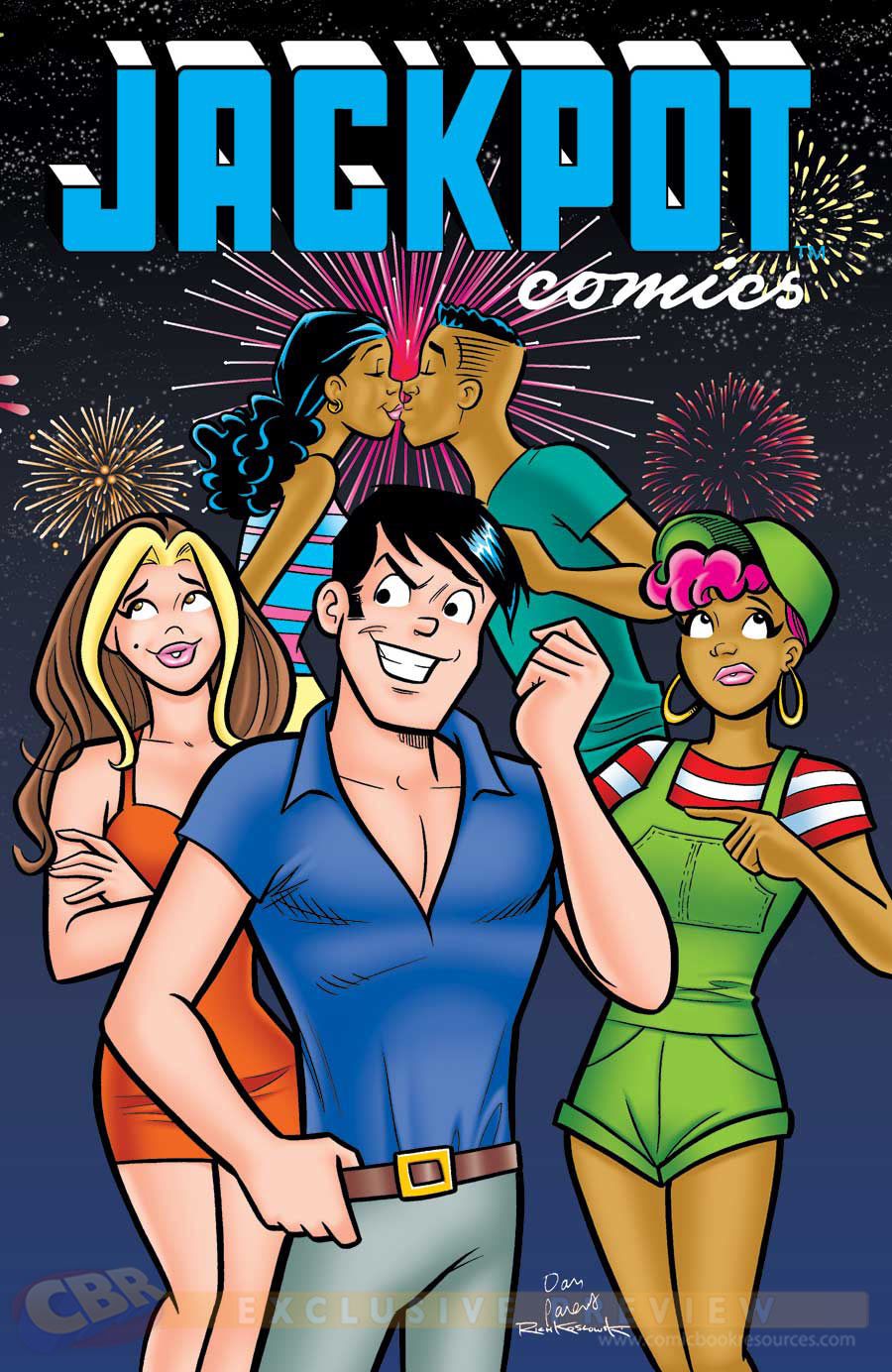Before Mark Waid and Fiona Staples launch the new, highly-touted "Archie" series in July, Tom DeFalco teams with an all-star roster of Archie artists to bid the Riverdale gang's current incarnation goodbye with June's #666, the series' final issue.
Best known to comics fans for his work at Marvel Comics, including a lengthy stint as Editor in Chief, and co-creating Spider-Girl and Dazzler, DeFalco started his comics career at Archie in 1972. He returned to the company a few years ago as a freelance writer, where he's remained, penning with the occasional project when the publisher has called upon his not inconsiderable experience and talents.
Mark Waid Discusses "Archie's" "Blank Slate Fresh Start" with Relaunched Series
In an engaging and candid discussion about writing the final issue of the iconic series -- he jokingly describes himself as "angry" he wasn't the person to come up with the tale's concept -- DeFalco shares his thoughts about the challenge of reinventing characters, and writing his own final comic book story.
CBR News: While you've worked with the publisher on numerous projects, you're not really known as an "Archie guy." How did you come to write the "last issue" of "Archie?"
Tom DeFalco: Mike Pellerito, the President of the company, called me up at one point and said, I need some help with an Archie story, can you help me out? I was on the road at the time and was busy, but I got in touch with him. He explained to me that they were going to do the last Archie story and he asked me if I was interested in writing it. I'm no fool -- naturally, I said yes. [Laughs]
I have always loved the traditional Archie characters. That's where I began my career. I thought, this could be fun. Of course, it could be terrifying too, but at this stage of my existence, I tend to only take assignments that make me nervous. If they aren't scary to me, why bother? [Laughs]
How exactly does one approach the "last" Archie story?
One approaches it many different times and in many different ways. I thought about it for a while. Should we do "Whatever Happened To That Boy From Riverdale?" [Laughs] I thought of a story, and I pitched it to them. I kept saying, you guys have to brutal on this. Nothing I do -- or that anybody else does -- will be good enough for this. Just keep being brutal. We went through a couple of ideas and actually I think Mike and Victor Gorelick -- Victor was my very first boss -- came up with the basic concept. I thought, wow, that's actually such a good concept, I'm angry I didn't think of it.
You just referenced Alan Moore's classic Superman story, "Whatever Happened to the Man of Tomorrow," which is one of the great -- if not the greatest -- last stories of a character.
Yes. We ultimately did not go in that direction.
EXCLUSIVE: J. Scott Campbell, David Mack & More Cover "Archie" #1
Paul Kupperberg, in "Life with Archie," had a chance to not just write the death of Archie, but also the issue after, dealing with what Archie means to Riverdale, his friends, etc. There are a few ways to approach such a story.
If you have ten writers in a room and told them to write the last Archie story, you'd get ten completely different stories that all bounced around the same themes and the same concepts. On the one hand, I was lucky that they asked me to do it, but I'm not sure if I was the right guy for this. Dan Parent and Fernando Ruiz are drawing chapters of the comic, but either one of those guys could have easily done a story that would probably be much better than what I came up with. I just happened to luck out.
You started working at Archie in 1972. Since then, you've worked all over, written comics for many companies, yet you always find yourself back in Riverdale. What, for you, is the appeal of the Archie characters?
It's the whole Archie universe. This is a safe and fun universe where almost anything can happen, and ultimately, it's always a good visit. Most of the time, the visit is going to result in a lot of laughter or maybe a touch to the heart. That's rare with comics these days. The superhero stuff tends to be action and angst -- although these days they seem to be focusing more on action and forgotten all about the angst. They're going grim and grittier, but Archie has always been a safe, fun place. It's endured, where some of the other safe, fun places have slowly slipped away over the years. We no longer have Richie Rich, or Casper the Friendly Ghost, or those kinds of comic books.
When you started at Archie, the people we think of the iconic Archie artists were still alive and working -- people like Harry Lucey, Dan DeCarlo and Samm Schwartz. What did you learn from your time working there?
That's where I really learned my craft. Seeing how certain things worked in a script -- and not worked -- once an artist drew it. Learning how to pace a story. Learning how to get your characterization in quickly. To have a beginning, middle, end in five pages. My time at Archie really taught me the basics that have carried throughout my life, in all the different kinds of writing I've done. Every time Samm got one of my scripts, he would give me tips and would basically tell me, "Kid you shouldn't have done this, you shouldn't have done that, you should have done this." It was like going to school without having to pay tuition.
I also got a chance to work with Frank Doyle, who was the greatest writer for this sort of stuff. All of those guys were so free with their knowledge. I'm so thankful for all the things I learned from them. To me, you have to know how to do a five-page story in order to know how to do a ten-page story or a twenty-page story or a fifty-page story. These days, I sometimes see new writers do a sixty-page story that doesn't have the elements you need in a five-page story, because they were never trained properly.
When you returned to Archie as a freelancer, Victor Gorelick was still there, but was it a very different company?
Yes. When I first started, John Goldwater -- who was the father of the current Jon Goldwater -- was in charge with Richard Goldwater and Michael Silberkleit handling the day to day operations. Eventually, Richard and Michael took it over, and sadly, both of those gentlemen have passed away. I worked closely with Richard and Michael. I got to work with Big John on many an occasion. Archie was a family. It was a family operation, and when the time came to leave, on the one hand, I knew I was doing the right thing for me, but on the other hand, I left with tears in my eyes because I thoroughly enjoyed my time at Archie. I learned a lot. I loved the characters. I loved the guys I was working with.
Over the years, we all stayed in touch. At one point, Victor asked me if I'd be interested in doing a story and I said, why not? On any given week, I can't tell you whether I'm actually working for Archie or not. Sometimes, months go by and I don't hear from them, but then they call. I love doing comics, and I try to carve out the time to do it whenever I get the opportunity.
You've worked at Marvel and DC as a writer and editor, where you worked on comics that were relaunched and reinvented. What's important about doing that, and what are the big pitfalls that you've found?
Any time you're doing a major relaunch, you're making a very big gamble. Are people going to look at this as a jumping on point, or a jumping off point? Will the readers of Archie look at this new stuff and say, this is not what I'm looking for and jump off? Or will more readers look at it and say hey, this could be very interesting; I'm going to jump on? Some things work. Some things don't work. The New 52 for DC obviously worked because it really jumped their sales for a few years. Some of the relaunches of the "Fantastic Four" obviously did not work, because they had to keep re-relaunching the title.
It's always a big gamble -- and the gamble is not based on the quality of the material. I'm sure that the guys who worked on some of the "Fantastic Four" relaunches were quality guys doing quality material, but for whatever reason, it did not resonate with the marketplace. The truth is, nobody sets out to do a bad story. Everybody sets out to do the best story that they can. Sometimes those stories work, and sometimes they don't.
The images from Fiona Staples that have been released are gorgeous, but as you say, we'll have to wait and see how the comic is received.
That's something we won't know for a good year or more. You've got her and Mark Waid doing the writing. That's a great team there. I'm sure they're going to produce quality material. Whether or not it succeeds, that's ultimately up to the marketplace. I can tell you, having sat on the other side of the desk, you never know how the marketplace is going to react. Sometimes they embrace things, and sometimes they don't.
That's true, but the Archie characters have been drawn in many ways. We think about people like Dan Parent and Fernando Ruiz drawing in an "Archie style," but they're very different from Bob Montana and others who defined Archie.
Absolutely. I loved Harry Lucey's stuff, I loved Samm Schwartz's stuff, I loved Dan DeCarlo's stuff, I loved Stan Goldberg's stuff, but those four artists are so dramatically different from each other. I know that to certain readers' eye, it all looks the same, but I have no idea how you can say that. To me, Harry Lucey and Dan DeCarlo were great, but they were like Ditko and Kirby -- they almost don't belong in the same universe together. And yet, it worked.
I know you can't give out any details, but is there anything about the issue that you want to say in closing?
The only detail I can say is we do delve into the history of Archie and what Archie has meant to the people of Riverdale. Hopefully there will be some laughs, and maybe even a couple of tears.
Also, "Fantastic Four" is coming to its last issue and they asked me to do a story for that. So I'm going to be featured in two last issues this year. They figure, if we want to kill the book, bring on DeFalco! [Laughs]
Was there any conversation about ending "Archie" with issue #666? I'm not very superstitious, but it feels ominous.
[Laughs] That was just the luck of the draw, but we make use of that number in the last story. C'mon, you didn't think I'd pass up a gag like that, did you? [Laughs] We go for a bunch of obvious gags and make a lot of in-jokes and out-jokes, and we ended up having a lot of fun with that last story. At least I did. I just hope the readers do, too.
Will this issue be the last issue of "Archie" that you'll be writing?
As of now it's my last Archie issue, but I can't tell you what's going to happen after we hang up this phone. For all I know, I'll get a call later this afternoon, tomorrow, next week. At this stage of the game, whatever comic book story I'm writing, for whatever company I'm writing, I just assume it's going to be my last one. And someday, I'll be right. [Laughs] I'm at a good place, so when I get to do comics, I can just have a thoroughly good time.

